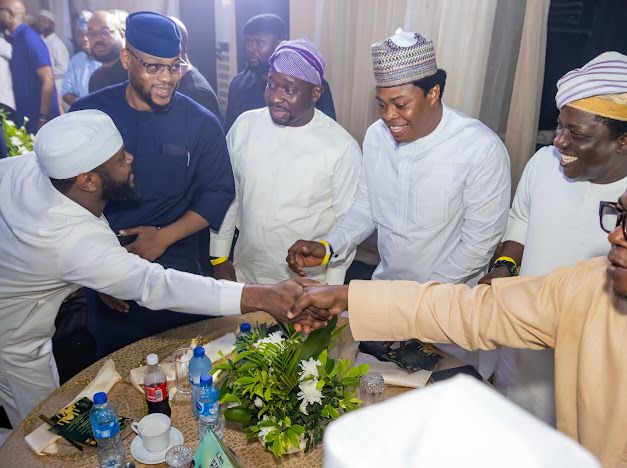Seyi Tinubu, son of Nigerian President Bola Tinubu, hosted a significant Iftar dinner in Lagos, bringing together youth leaders, political figures, and community stakeholders for an evening of dialogue and engagement during the holy month of Ramadan. The event, held at the Ikeja Central Mosque, underscored Tinubu’s commitment to youth empowerment, national unity, and interfaith collaboration. The Iftar dinner, a traditional breaking of the fast observed by Muslims during Ramadan, served as a platform for Tinubu to connect with the younger generation and reinforce his dedication to fostering their active participation in nation-building.
The gathering was infused with a spirit of unity and mutual respect, as Tinubu received a warm welcome from prominent Muslim clerics who lauded his philanthropic endeavors and his contributions to various communities, transcending religious boundaries. Sheikh Abubakir Mohammed Solaty, the officiating cleric, acknowledged Tinubu’s commitment to peace and socioeconomic development, expressing support for President Tinubu’s reform agenda. This interfaith gesture highlighted the importance of collaborative efforts in nation-building and the potential of shared values in overcoming societal divides.
Addressing the attendees, Seyi Tinubu emphasized the significance of Ramadan as a period of reflection, compassion, and strengthening community bonds. He reiterated his commitment to empowering young people, recognizing their pivotal role in shaping the nation’s future. Tinubu’s message resonated with the young leaders present, who saw in his words a genuine commitment to their aspirations and a recognition of their potential as agents of change. This focus on youth empowerment signaled a strategic investment in the nation’s human capital and a recognition of the demographic dividend that a vibrant and engaged youth population represents.
The event attracted a diverse array of participants, including members of the Young Progressives in Lagos State, political appointees, and representatives from various interest groups across the Southwest region. This diverse representation underscored the broad appeal of Tinubu’s message and his ability to connect with different segments of society. The presence of key members of the Lagos State House of Assembly, including Deputy Speaker Mojisola Meranda and House Committee Chairman on Youths Olamiju Akala, further emphasized the political significance of the event and the importance of youth engagement in the political process.
Tinubu’s Iftar dinner in Lagos was part of a broader engagement tour that had taken him to several northern states since the commencement of Ramadan. This strategic outreach reflects a conscious effort to bridge geographical and cultural divides, fostering a sense of national unity and shared purpose. Accompanying Tinubu were prominent figures from the government and public sector, including Minister of Youth Ayodele Olawande, Director-General of the Small and Medium Enterprises Development Agency of Nigeria Charles Odii, and Executive Vice Chairman of the National Agency for Science and Engineering Infrastructure Khalil Suleiman Halilu. Their presence underscored the importance of collaborative partnerships between government agencies and private initiatives in driving youth empowerment and national development.
The Iftar dinner served as a powerful symbol of unity, bridging religious and generational divides. It showcased Seyi Tinubu’s commitment to youth empowerment and national progress, echoing his father’s reform agenda. The event’s success lay not only in bringing together diverse stakeholders but also in fostering a shared vision for a Nigeria where young people are empowered to contribute meaningfully to the nation’s growth and development. The emphasis on youth engagement, interfaith dialogue, and collaborative partnerships signifies a promising step towards building a more inclusive and prosperous future for Nigeria. The event’s strategic timing during Ramadan further amplified its message of unity and compassion, reinforcing the importance of shared values in building a stronger and more cohesive nation.


